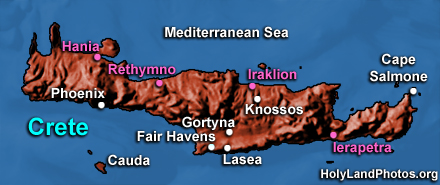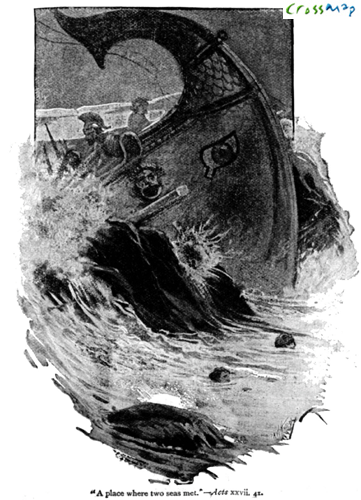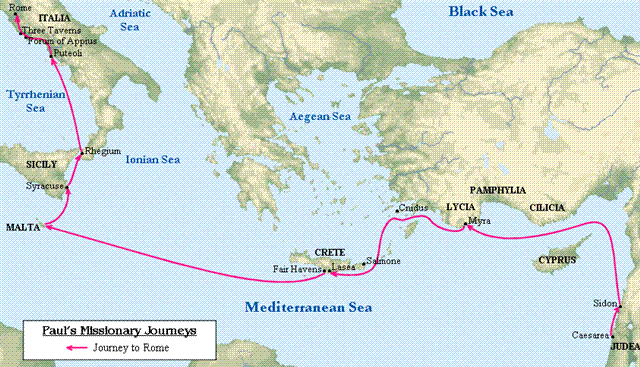Introduction: Agrippa said to Festus, “This man could have been set free if he had not appealed to Caesar.” (26:32) That point of view was man’s perspective not God’s. The point of view that ruled the day was God’s–Paul was destined to testify in Rome and could not be set free from that plan.  F. B. Meyer wrote regarding the storm that Paul encountered on this trip, “If I am told that I am to take a journey that is a dangerous trip, every jolt along the way will remind me that I am on the right road.”Â
Acts 27Â – Paul sails to Rome
- This was a memory making event in Luke’s life–he includes more details of this journey than of any other in the Book of Acts.
- It was clear that this was going to be a dangerous trip and seasoned traveler Paul warned the crew not to proceed. (verse 10). Those in charge preferred to press on and hoped to winter in the safe harbor of Phoenix on the island of Crete. (verse 12)

- Before long, the ship was caught in hurricane force winds and the passengers were being carried away from Crete toward the island of Cauda. (verse 16)
- The storm was so strong that the crew strapped ropes under the ship to hold it together and dropped anchors hoping they would not be marooned on sandbars in shallow water. (verse 17)
- Battered for days, they threw weight overboard in hopes that they would stay afloat. Soon they gave up hope of being saved. (verse 20)
Q: What help does this chapter about a ship in a storm offer present day Christians?
1. It teaches that God will not allow our foolish choices to interrupt His wise plans!
- It seems clear that the pilot of the ship put this mission in serious danger by choosing to sail into winter weather.  Â
- We are not all knowing people–our best choices are often foolish ones!
Q: The question is not whether we are able to make good choices…it is what does God do in the face of our rotten ones?
- Using an angel, God makes it clear that He has not abandoned Paul or His plan to see him to Rome. He gives him assurance of His constant Presence with Paul and the crew and tells to keep up the courage. He prepares him for a wreck that will one that he and the crew will survive. (verse 23-26)
2. It teaches that we can be in the will of God and in the midst of great storms of life.
- Christians are not promised exemption from storms…we are promised His Presence in the midst of all the paths we are called to walk–sometimes sharp and rocky, sometimes smooth and sweet and restful.
3. It teaches that the way to have calm in the storm is to trust in the Word of God rather than the storm that threatens to undo you.
- Luke paints a picture of Paul as calm and God-confident in contrast to panic stricken passengers and crew.
- He reveals Paul’s heart is stayed on God’s Word, “for I have faith in God that it will happen just as He told me.” (27:25)
- Paul is being visited with the supernatural gift of courage and it overflows as a source of hope and help to those who were afraid.
4. It teaches that storms are part of living in a fallen world.
Application:
- Will I like Paul drop steadying anchors when I am in a storm to keep me from being fearful and dashed upon the rocks?
- The anchor of staying alert to God’s Presence.
- The anchor of repentance for my inclination toward disbelief
- The anchor of remembering God’s past faithfulness and sure promises
- The anchor of trust that new grace is available for every storm
- The anchor of prayer to share my fear with God and exchange it for steadying faith.
Acts 28Â Â Ashore in Malta and on to Rome
- After being caught up in the northeaster for 14 days, the embattled crew sensed that land was near.
- When daylight came, their suspicions were confirmed so they cut the anchors loose so that the ship would drift in the direction of the shore.
- The ship struck a sandbar and all the crew and passengers escaped by jumping overboard and swimming or floating to shore.
- When the survivors dragged themselves ashore, they discovered that the storm had blown them to the island of Malta.
- Luke highlights that their reception by the natives was “unusual kindness” suggesting that the Holy Spirit was softening the hearts of those living there–a sign that there was witnessing work planned by God and to be carried out by His chosen instrument Paul.
- It is clear to Luke that this storm was not an accident but a God event–He was on mission–seeking to save.
- Paul demonstrates the One he follows when as a servant leader he gathers wood to make a fire to warm his storm weary companions.
- God arranged a sign and wonder to capture the islanders attention–Paul survived a snake bite and the islanders thought he was a god. Remembering how Paul and Barnabas responded when this happened to them in Lystra, it is safe to assume that Paul did what he always did–used this mistake as the opening to share the gospel of Christ.
- Another sign was given when Paul healed the father of Publius, the leader of the island.
- The best way to win an island of people is to win their leader!
- These wondrous kindnesses to the residents of Malta were confirming signs that the God that Paul worshipped was God Almighty–the only God–God over evil snakes and dissipating illness.Â
- God Man Jesus was continuing His healing ministry through Paul — continuing to invite people to come to the One who saves from the greater illness–the terminal illness of sin.
“Preaching the Gospel and the ministry of healing are inseparable. When healing is understood in the deeper context of salvation, wholeness, health and ultimate well-being, we can practice both preaching and healing prayer as a part of Christ’s ministry through us.” Lloyd Ogilvie, p. 352
Acts 28:11-31Â Paul Arrives in Rome
- We can see Paul continuing in calmness as he arrives in Rome–there is no sense of rush or urgency.
- He seeks out the Jews in the city to share Christ with them. He spoke with them from morning to evening pleading for their hearts to see the truth that their anticipated Messiah had come in the person of Jesus. That the kingdom they waited on was one of the heart not a political overthrow of Rome.
- Luke highlights again the effect that the gospel in a crowd–it divides just like the same sun can soften butter but hardens clay—some were convinced but other would not believe.
Conclusion:Â Luke closes the book abruptly without resovling the question of what happened to Paul–since he highlights that the Word of God continued to be preached with boldness and without hindrance, we sense that he wants us to know that the topic of his book is the gospel of Christ not Paul!
The Word of God is not bound!Â
We will close our study thinking of all that Luke has shared and pondering the words of the Isaac Watts hymn “Am I A Soldier of the Cross?”
Verse 1
Am I a soldier of the cross,
A follower of the Lamb,
And shall I fear to own His cause,
Or blush to speak His Name?
Verse 2
Must I be carried to the skies
On flowery beds of ease,
While others fought to win the prize,
And sailed through bloody seas?
Verse 3
Are there no foes for me to face?
Must I not stem the flood?
Is this vile world a friend to grace,
To help me on to God?
Verse 4
Sure I must fight, if I would reign;
Increase my courage, Lord.
I’ll bear the toil, endure the pain,
Supported by Thy Word.


